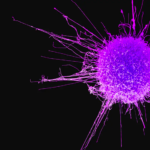Cancer survival rates or survival statistics are indicative of the percentage of people who survive a certain type of cancer for a specific amount of time. Cancer statistics often use an overall five-year survival rate, which is an estimation of the percentage of people who are still alive five years after their diagnosis. Survival also varies for different types of cancer and also for common cancers in males and in females. The 5-year survival is also calculated by the stage of the cancer at the time of diagnosis, whether it is confined to the organ affected or spread further. Survival rates also vary between the developed and developing countries.
- The overall five-year survival rate for bladder cancer is 78%, this means that of all people who have bladder cancer, 78 of every 100 are living five years after diagnosis.
- An estimated 52% of people diagnosed with early-stage lung cancer live for at least five years after diagnosis.
- The five-year survival rate for people diagnosed with late-stage lung cancer that has spread (metastasized) to other areas of the body is 4%.
Overall survival rates, however, do not say whether the cancer survivors are in remission or have relapsed and still undergoing treatment at five years. This information can be obtained from the disease-free survival rates (percentage of people who have achieved cancer remission i.e. without recurrence of cancer 5 years after diagnosis) and the progression-free survival rates (percentage of people in whom the cancer is still present but is not progressing).
Cancer survival rates are used to understand prognosis or the disease outcome as well as developing a treatment plan. But they do not tell about the individual prognosis and they also do not factor in the comorbidities, which may affect chances of survival. Hence, they should be interpreted with caution.
Over the years, the five-year survival has increased, which reflects the advances in oncology in the form of treatment and more importantly, diagnostic techniques that allow early detection, which can come with greater awareness.







